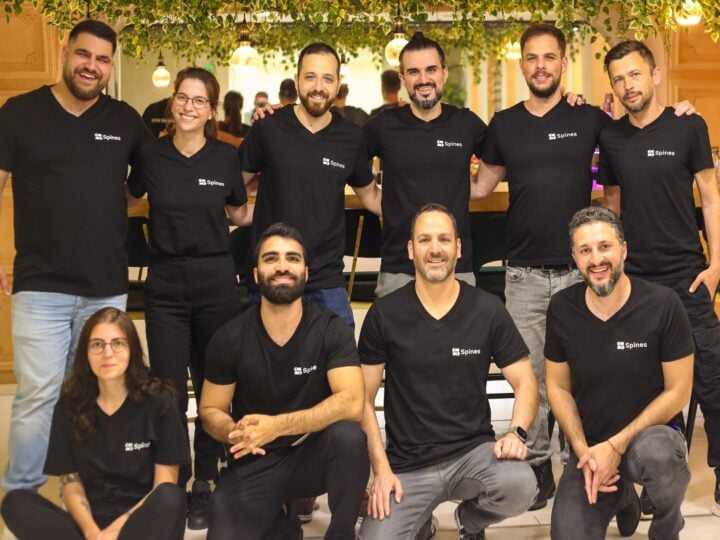If you didn’t consider the logistics of moving cargo as a particularly sexy topic, it’s time to take a fresh look. Because the past year has shown us just how vital and vulnerable are the supply chains we always took for granted (remember the toilet paper shortage?).
That’s why logistics innovation was identified as one of the top 10 post-pandemic tech trends at the virtual OurCrowd Global Investor Summit on July 13.
Because of Covid, of course, the summit couldn’t be held live in Jerusalem as usual. But the management of the global venture investment platform didn’t want anyone to miss the popular session on trends, especially since Covid has drastically affected the whole picture.
“It’s extremely important this year given the unprecedented growth of the tech investment scene driven by the unbelievable digital transformation that has affected all of our lives,” said Jon Medved, OurCrowd’s founder and CEO.
“There is no better time to analyze what the tech trends are for the smart investor, and where the technology market is moving.”
Speakers included Andrea Wasserman, head of global commerce at Verizon Media IT security industry expert Richard Stiennon; and Dr. Paul Rothman, dean of the School of Medicine & CEO at Johns Hopkins Medicine.
Ready for the top trends?
1. Life becomes virtual
From ecommerce to work from home (WFH) to online parties and even prayer services, the world has moved on-screen, and startup tech is powering it.
“We provided a set of tools to help big companies successfully run events, enabling them to be more data-driven and strategic,” Bizzabo CEO Eran Ben-Shushan explained.
“At the beginning of Covid, we didn’t know what events would look like. Very quickly as a company, we pivoted thanks to the incredible culture and talent that we have here. We believe that looking to the future of events, and future trends that we are identifying, it is all about reinventing the hybrid experience.”
Examples of Israeli companies in this space:
• Papaya Global, which has automated global payroll and revolutionized workplace onboarding and engagement.
• VidiPlus, whose drag-and-drop virtual presentation software makes video conferencing more compelling with 3D visuals, slideshows, web browsers and videos appearing in real time next to the presenter in the same frame.
2. Science is for dinner
Plant-based and lab-produced food is starting to disrupt a $6 trillion industry, meeting demand for quantity, quality and sustainability.
“There is a consensus among experts that one of the biggest challenges in the food industry is finding alternative protein sources to feed the increasing world population,” said Tammy Meiron, CTO of Israel’s Fresh Start food-tech incubator.
“The global and alternative protein market is expected to reach $27 billion by 2027. We are in a continuous process of climate crisis negatively affecting the crops, and we have more people to feed with the same land and water resources.”
Examples of Israeli companies in this space:
• Aleph Farms, which is developing slaughter-free, carbon-neutral beefsteak cultivated from animal cells.
• ChickP, whose chickpea isolate is now being piloted by several manufacturers as a plant-based, high-protein alternative for eggs in mayonnaise.
3. Retailers double down on digital
As 60% of our interactions with companies are now online, retailers are ramping up AI and AR personalization, localization, voice shopping and chatbots.
Examples of Israeli companies in this space:
• ByondXR, which allows retailers to make their virtual stores and showrooms as close to the physical experience as possible, using virtual reality.
• Trigo, an innovator in frictionless checkout technology, which recently signed a partnership agreement to help Google Cloud’s partner grocery retailers accelerate their digital transformation with AI-powered autonomous stores.
4. Water means business
Innovation is being put to the test to make the world’s most essential natural resource safe and abundant for individuals and industry alike. Water technology has traditionally been an Israeli water-tech stronghold and it’s only getting bigger.
Eli Nir, leading water technology investor and OurCrowd partner, explained, “Water technology companies have been around for a long time. What we are seeing today is a new breed of companies which are truly technology companies. With significant and excellent IT in a range of fields, all the way into AI and cyber security, using machine learning to prevent hackers getting into critical water infrastructure.”
Examples of Israeli companies in this space:
• BlueGreen Water Technologies, whose LakeGuard technology is clearing toxic blue-green algae from contaminated lakes, restoring billions of gallons of drinking water.
• ixDen, which secures industrial sensors and IoT devices in water systems from malicious cyber and cyber-physical attacks, helping water utilities provide stable and uninterrupted distribution of clean water.
5. Data gets really, really big
“Big data” increasingly is considered the world’s greatest non-natural resource. But the huge amount of available data needs to be more easily accessible, organized, managed and understood if it is to fulfill its potential of advancing just about every industry.
“We call data ‘the new oil’ because information lets us understand our world and how it works, and it is the main driver to make faster, more accurate, more productive and more scalable decisions,” says Stav Erez, partner in LabsO/2 fund and incubator.
Examples of Israeli companies in this sector:
• Materials Zone, which accelerates the advent of new technologies by providing a set of tools and services that harvest, interpret, and exchange data related to materials science.
• Dataloop, which streamlines the process of preparing visual data for machine learning in verticals ranging from autonomous driving to retail and ag-tech.
6. Logistics are suddenly sexy
Each year, some $19 trillion worth of goods are moved from country to country. From basic supply shortages at the beginning of the pandemic to the cargo ship jam in the Suez Canal that’s taken months to clear out, we all are painfully aware that logistics are critical to daily life.
“The pandemic has more than doubled the inflation rate of ecommerce from 15% annually before 2020, to almost 40% today, with significant impact across the supply chain. It is clear that supply chains must evolve in efficiency, capacity and agility,” said Ilan Reingold, CEO of BionicHIVE, an Israeli startup developing a synchronized autonomous robotic picking/packing/shipping/receiving fleet for warehouses.
Examples of Israeli companies in this sector:
• Freightos, which powers global air, ocean and land freight cost comparison, booking and management for some 10,000 import and export companies.
• Trellis, which uses AI and cognitive learning to optimize the food, beverage and agriculture supply chain.
7. Telemedicine a day keeps the doctor away
Onsite diagnostic testing, online medical visits and remote monitoring are just the beginning of the revolution in healthcare. Telemedicine is a win-win for patients, who do not have to leave the house to get care, and for overworked healthcare providers — and it keeps everyone safer from exposure to viruses.
Israeli-founded Tytocare has become one of the most impactful companies in telemedicine – not just at home but also in hospitals, said Dr. Eyal Zimlichman, deputy director general, chief medical officer and chief innovation officer at Sheba Medical Center.
“Nobody thought we would have a problem with doctors examining patients at bedside until the Covid crisis,” said Zimlichman. Sheba began using Tytocare’s remote medical exam kit “to have minimal contact between our staff and patients with the virus so that we can minimize exposure to the staff.”
Examples of Israeli companies in this sector:
• Sweetch helps patients manage chronic diseases such as cancer, cardiovascular and autoimmune diseases with a mobile-based digital coach that provides personalized recommendations.
• Sight Diagnostics uses a finger prick and two drops of blood to perform an in-office complete blood count in minutes, reducing wait times and exposure for lab technicians, clinicians and patients. Jerusalem’s Shaare Zedek Medical Center is now testing how Sight’s OLO machine could detect malignant lymphocytes quickly and automatically for early signs of blood cancer.
8. Spatial computing maps the future
Advanced virtual, augmented and mixed-reality technologies are driving the spatial computing revolution, which will bring human-machine and machine-machine interactions to new levels.
Industry expert Ori Inbar explained: “Rather than interact with computers on a two-dimensional screen, the new wave of computing is all around us. We see information in 3D, and it behaves just like real objects behave in the real world. Many AR businesses have seen tremendous growth over the past year as the demand for remote technologies has skyrocketed.”
Examples of Israeli companies in this sector:
• TetaVI, whose portable volumetric video capture technology creates high-fidelity holograms that deliver immersive viewer experiences on any device.
• Edgybees, whose AI-powered, satellite-generated geographical positioning imagery, coupled with computer vision and machine learning, generates real-time, high-precision overlays of roads, landmarks and other mission-critical data on top of live video feeds – enabling defense, public safety and first-response teams to accomplish missions quickly and safely.
9. Energy goes green, clean and lean
Innovative solutions are taking hold to meet both surging energy needs and demands for sustainability.
Examples of Israeli companies in this sector:
• H2PRO is working to enable affordable green hydrogen production at scale, to power homes, factories, cars, ships and airplanes with environmentally friendly hydrogen for less than existing fossil fuel and other power sources.
• mPrest, using software technology originally used for defense, provides visibility and control over complex, distributed operations such as power grids. mPrest recently collaborated with Microsoft Azure to bring energy software solutions to leading energy companies, advancing the goal of zero emissions and greater sustainability.
10. Quantum computing beefs up, scales up and shores up
The potential of quantum computing has been blunted by challenges in scalability, programming, and security, but help is on the way.
“Quantum computing is being discussed for the last 40 years, but only in the last few years it’s turned into a reality,” said Nir Minerbi, CEO of Israeli quantum software developer Classiq. “In a few years we’ll have large-scale quantum computers that will be able to perform tasks that no supercomputer in the world could ever have done.”
Examples of Israeli companies in this sector:
• QuantLR, which developed the world’s first and only secure, low-cost quantum cryptography solution using the principles of quantum physics. QuantLR designed one of the 44 experiments that will go into space with Israeli astronaut Eytan Stibbe in 2022.
• Quantum Machines, whose first-of-its-kind quantum control hardware and software platform enables running complex quantum algorithms from complex multi-qubit calibrations to quantum error correction.

















